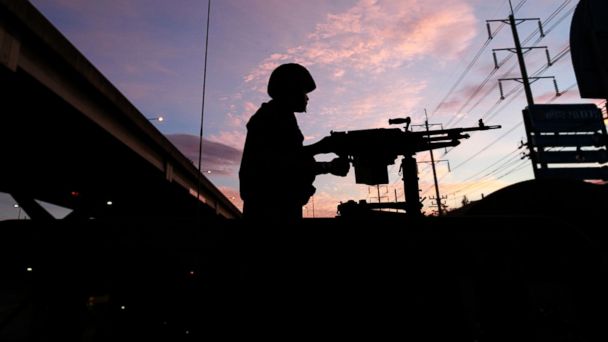US Says Military Takeovers in Libya, Thailand Are Not Coups

A Thai soldier mans his machine gun atop a military vehicle outside the Centre for the Administration of Peace and Order after soldiers were sent in to seize the center on May 20, 2014 in Bangkok, Thailand. Wason Wanichakorn/AP Photo.
Military forces have taken control in Libya and Thailand, but the United States isn't calling them coups - at least not yet, anyway.
In Libya, forces loyal to a retired general took over parliament over the weekend. In Thailand, the military declared martial law, giving itself substantial powers including the right to detain people and ban political TV programming.
State Department spokesperson Jen Psaki said the U.S. wasn't characterizing either situation as a coup, defined by national security expert Edward Luttwak in his book Coup d'Etat: A Practical Handbook as "the infiltration of a small but critical segment of the state apparatus, which is then used to displace the government from its control of the remainder."
Of Libya, Psaki said today: "We do not condone or support the actions on the ground, and nor have we assisted with these actions."
Regarding Thailand, she noted that martial law is allowed within the Thai constitution and that the U.S. has remained in communication with both the military and the government, which said this morning that it was still in control even though the military had not informed it of the martial law decree in advance.
Psaki added that the Thai military promised the U.S. that it would relinquish control back to the government.
"We expect them to abide by their commitment that this is a temporary action to prevent violence and to respect - and that they will respect democratic institutions," she said.
U.S. law prohibits the funding of countries "whose duly elected head of government is deposed by military coup d'etat or decree."
For that reason, the United States declined to characterize the Egyptian military's July 2013 removal of elected Egyptian president Mohamed Morsi as a coup. The U.S. did suspend some aid to Egypt later that year but resumed part of the money flow in April 2014 to ensure it carried out its responsibilities under the Egypt-Israel Peace Treaty.
Similarly, the U.S. has strategic interests in maintaining funding for Libya and Thailand.
The U.S. provided almost $190 million to Libya after the revolution that ended the Ghaddafi regime, and in FY2014 requested $5.9 million to support goals that have clear implications for U.S. security, including "accounting for and securing conventional weapons; building niche military capacities to address specific threats to Libya's sovereignty" and "strengthening counterterrorism cooperation."
The U.S. funds programs in Thailand that target human trafficking, narcotics and antiterrorism and in FY2014 requested $10 million in assistance funding.